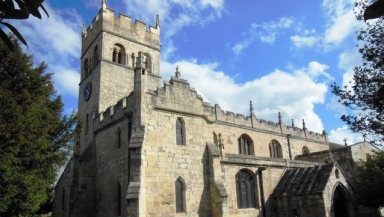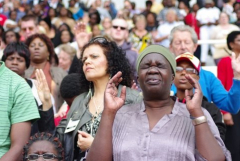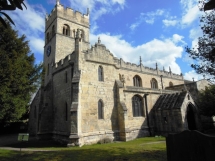
Decline in the Church of England has accelerated, according to a new survey. Other faiths, however, are growing in Britain, especially Islam.
The British Social Attitudes survey of nearly 3,000 people found that they proportion of people saying they are Anglican has fallen by by two fifths in 10 years, part of an overall picture of decline going back more than 30 years, according to the survey, by NatCen Social Research.
The proportion of British adults who said they are Anglican has fallen from 40 per cent in 1983 to 17 per cent in 2014. However the decline was steepest over the past decade when the proportion fell by two fifths in ten years, down from 29 per cent of the population in 2004.
In real terms, says NatCen, this suggests the number of Anglicans in Britain has fallen by as many as 4.5 million over the last ten years from around 13 million people to about 8.5 million today.
The biggest group in the survey was made up of people who said they have no religion, who accounted for nearly half (49 per cent) of the population, up from 31 per cent in 1983 and 43 per cent a decade ago.
Most of the Christian decline appears to have been in the established church, with other denominations remaining stable over the three decades.

Roman Catholics and those grouped together as 'other', including Methodists, Presbyterians and non-denominational Christians, made up 8 per cent and 17 per cent of the population respectively in 2014, a similar level to 1983.
Non-Christian religions rose from 2 per cent in 1983 to 8 per cent in 2014. The biggest rise was in Islam, which grew ten-fold, from around half a percent of the population in 1983 to around 5 per cent in 2014.
Naomi Jones, NatCen's head of social attitudes, said: "The proportion of people saying that they are Anglican has fallen quite dramatically in the last ten years, coinciding with a rise in people saying they are not religious. Meanwhile, members of other Christian and non-Christian religions have remained relatively constant and even increased."
Previous analysis of British Social Attitudes indicates that the main explanation for the increase in British people saying they are not religious is because each generation is less religious than the next. As older generations die the overall population gradually becomes less religious.
But Jones said this doesn't explain why the Anglican Church alone continues to decline. "One explanation for this might be that the numbers of Catholic and non-Christian people in Britain may have been supplemented by migrants with strong religious beliefs.
"Another explanation could be that in the past religion played a more prominent role in people's identity. We know from recent NatCen research that people are less likely than in previous years to see being Christian as an important component of being British. Therefore, fewer British people may feel that the Church of England is an important part of their identity nowadays."

















